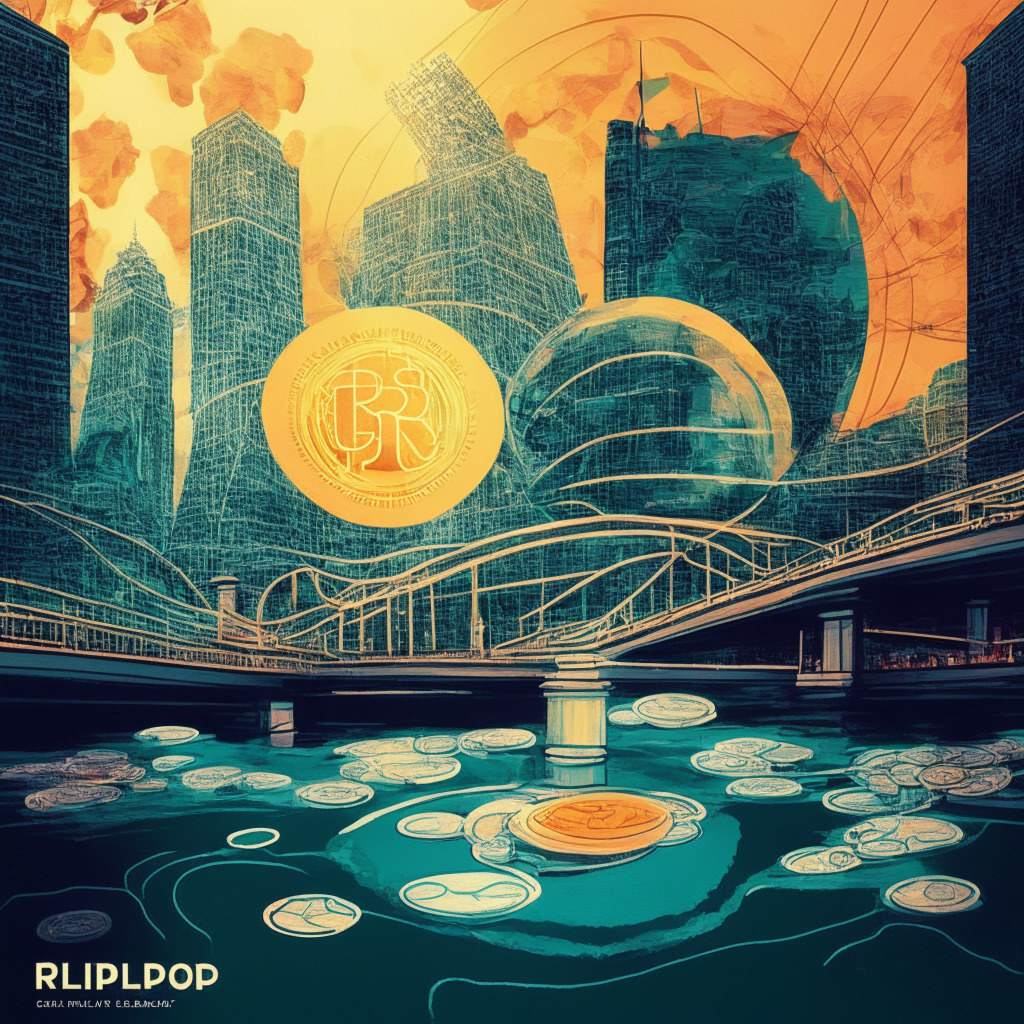Denis Beau, the first deputy governor of Banque de France, advocates Central Bank Digital Currencies (CBDCs) as the future of the global monetary system. However, he acknowledges the potential risks of crypto technologies. He believes that CBDCs need to focus on cross-border payments and invites a partnership between public and private sectors for efficiency. Beau proposes that CBDCs follow established models from the Bank for International Settlements and International Monetary fund. Despite skepticism, project collaborations like Project Mariana indicate the ongoing exploration of CBDCs and blockchain technology.
Search Results for: Monetary Authority of Singapore
CBDCs: A Cornerstone for Future International Monetary System & the Tokenization of Finance
The Banque de France views central bank digital currency (CBDC) as a crucial component for the new international monetary system, enhancing cross-border payments. It’s being considered from an international perspective right from the outset. Two potential development pathways include building interoperability with legacy systems and creating regional or international platforms for CBDCs.
Ripple’s Major Milestone: Singapore MPI License Amid Regulatory Scrutiny in the US
Ripple Markets APAC Pte Ltd, the Singapore branch of crypto-payment giant Ripple, has received its Major Payments Institution license from the Monetary Authority of Singapore. This permits Ripple to provide digital payment token services, marking a substantial stride towards wider crypto acceptance. In contrast to its regulatory challenges in the US, Ripple’s journey in Singapore has shown regulatory clarity and fostered a secure environment encouraging crypto investigation.
Ripple’s Rise in Singapore vs. Coinbase’s Legal Quagmire: Paving the Path for Crypto Regulation
The Monetary Authority of Singapore has awarded Ripple a digital payment tokens license, enhancing its position in the digital asset market. Concurrently, the SEC and Coinbase are engaged in a contentious lawsuit, calling attention to potential hurdles and the urgent need for clear cryptocurrency regulation.
Sygnum Singapore’s Digital Breakthrough: Unpacking the Pros and Cons of Singapore’s Sieve-Like Crypto Compliance
Sygnum Singapore, a subsidiary of the Swiss-based crypto bank, has secured its Major Payment Institution License from the Monetary Authority of Singapore. The license enables Sygnum to provide regulated digital payment token brokerage services, breaking previous transaction limits, and paving the way for potential expansion into Asia-Pacific markets.
Exploring Singapore’s Regulatory Leap towards Blockchain: A Swift Transformation or a Risky Venture?
The Monetary Authority of Singapore has granted a Major Payment Institution Licence to Sygnum Singapore, enabling it to extend its services to the Asia–Pacific market. However, the recent downfall of Silvergate Bank, due to high-risk crypto activities, underscores the need for balancing growth and safety in blockchain adoption.
Crypto Regulation: Singapore’s Strides Forward with MPI Licenses to GSR Markets and Coinbase
The Monetary Authority of Singapore (MAS) granted GSR Markets, a crypto liquidity provider, a Major Payment Institution license. GSR, like Coinbase, can now provide crypto and fiat-linked services to Singaporean entities and residents, expanding crypto regulation. Despite potential challenges, including transaction irreversibility and crypto’s inherent volatility, Singapore’s balance of fostering innovation while ensuring safety allows over 700 Web3 companies to thrive, indicating a significant crypto future for finance.
Singapore’s Crypto Haven Status: An Alluring Opportunity or a Regulatory Minefield?
GSR Markets, a subsidiary of cryptocurrency market maker GSR, has secured in-principal approval for a Major Payment Institution (MPI) license from the Monetary Authority of Singapore. This may speed up the adoption of Web 3.0 and boost business investments in the APAC region, while demonstrating Singapore’s favorable stance toward cryptocurrencies.
Singapore’s Crypto Embrace: Coinbase’s MPI License Triumph and the Double-edged Sword of Security
“Coinbase, the crypto exchange, obtained a Major Payment Institution (MPI) license from Singapore’s Monetary Authority. This approval extends its digital token services in Singapore, augmenting its responsibility towards the expanding crypto and Web3 community. However, potential risks such as hacks, scams, and breaches loom large in the emerging cryptocurrency landscape.”
Coinbase’s Major Step: Securing MPI License under Singapore’s Payment Act
“Crypto exchange Coinbase has secured a full Major Payment Institution license in Singapore, permitting it to expand its crypto payment services. This progress aligns with Coinbase’s global aspirations, while resonating with Singapore’s leading-edge economic approach and regulations. However, the accompanying need for regulatory clarity and risk management is emphasized.”
Ground-breaking Partnership: Circle and Grab Aim to Introduce Web3 Wallet in Singapore
Circle Internet Financial, the company behind the USDC stablecoin, is partnering with global ride-hailing platform Grab to introduce a Web3 blockchain-based wallet in Singapore. The “Grab Web3 Wallet” will enable users to earn rewards and collect non-fungible token (NFT) vouchers, integrating digital assets into Grab’s existing services.
Blending Traditional Finance with DeFi: MetaComp’s Bold Game-Changer in Singapore’s Financial Scene
“MetaComp, Singapore’s digital asset platform, combines traditional finance with decentralized finance, allowing customers to purchase traditional securities with stablecoins. Despite some skepticism due to crypto volatility, the firm believes that fiat-pegged cryptocurrencies will penetrate the real economy.”
Navigating Cryptocurrency Roadblocks: Singapore’s Regulatory Approach and the FinTech Sandbox Dilemma
“The Monetary Authority of Singapore (MAS) announced no businesses qualified as cryptocurrency payment providers under the FinTech Regulatory Sandbox. MAS is cautious about adopting payment innovations and emphasizes a need for crypto businesses to demonstrate robust Anti-Money Laundering controls.”
Navigating the Crypto Landscape: Will Singapore’s President Bring Change or Continuity?
“Former finance minister Tharman Shanmugaratnam’s presidency bears ambiguity for Singapore’s crypto space. His skepticism yet hands-off approach towards cryptocurrencies provide a glimmer of optimism. The question looms; will his policy commitments hold amid crypto’s volatility and increased regulatory pressure?”
Singapore Elections: Uncertainty Looms over Future of Blockchain and Crypto Regulation
“Singapore’s presidential elections with Tharman Shanmugaratnam at the helm raises questions about forthcoming digital assets and blockchain policies. Known for his cautious stance on cryptocurrencies, its impact on Singapore’s relatively open approach to cryptocurrencies is uncertain.”
Newly Elected Singapore President and His Challenging Influence on Crypto Regulations
Singapore’s new president, Tharman Shanmugaratnam, with past finance roles may reshape fintech policies. His views on cryptocurrency, from ‘slightly crazy’ to its potential significant role in finance, could impact Singapore’s crypto regulatory balance amidst the aftermath of local crypto establishments’ failures.
Singapore vs New Zealand: Contrasting Crypto Regulatory Approaches Amid Global Uncertainty
New Zealand adopts a cautious approach towards digital currency, fearing that hasty regulatory measures could stifle innovation. However, Singapore takes a proactive stance, pushing stablecoin regulations diligently. This stark difference illustrates a global struggle in harmonizing blockchain technology and legal order.
Balancing Act: Singapore’s MAS Stablecoin Regulations and the Impact on Blockchain Evolution
Singapore’s Monetary Authority is reinforcing its blockchain future with revised stablecoin regulations, enforcing value stability. Despite concerns about limiting scope, these regulations aim to boost confidence and security while fostering blockchain advancement in a rapidly progressing digital currency landscape.
Singapore Central Bank’s Stablecoin Guidelines: Pros, Cons and the Future of Blockchain Regulation
Singapore’s central bank, the MAS, unveils its regulatory framework for stablecoins, endorsing a three business day timeline for single-currency stablecoin transfers, similar to regular domestic money transfers. Critics argue this fails to fully leverage blockchain’s instantaneous transaction capabilities, suggesting regulatory flexibility is needed to harness the technology’s full potential.
Regulating the Future: Implications of Singapore’s Revised Framework for Stablecoins
Singapore’s central bank, the Monetary Authority of Singapore (MAS), introduced a revised regulatory framework for single-currency stablecoins (SCS). The new guidelines aim to guarantee stability for SCS pegged to major currencies, potentially bolstering the use of stablecoins as a trusted digital medium of exchange.
Blockchain.com Secures Singapore’s MPI License: Balancing Crypto Innovation with Strict Regulation
“Crypto exchange, Blockchain.com, has secured a Major Payment Institution (MPI) license from the Monetary Authority of Singapore (MAS), following its preliminary endorsement last October. This development underscores the exchange’s expansion of its Digital Payment Token services to its institutional clients and investors in Singapore.”
Navigating the Crypto Tightrope: Singapore Red Cross’s Dilemma in Accepting Cryptocurrency Donations
The Singapore Red Cross recently started accepting cryptocurrencies as donations in partnership with a licensed crypto payment gateway, Triple-A. This advancement allows for anonymous donations, but all received are immediately converted into fiat due to the volatility of cryptocurrencies. The move represents an effort to balance technological evolution with economic realities.
Crypto Assets: Property or Currency? Unpacking Singapore’s High Court Verdict
“Cryptocurrency value derives from collective human perception, Judge Philip Jeyaretnam stated in a Singapore High Court verdict that equated digital currencies with fiat money. His ruling, recognizing crypto assets as property despite their incorporeal nature, could initiate a sea change in cryptocurrencies’ legal status.”
Breaking Boundaries: Singapore High Court Draws Crypto Closer to Fiat, Defines it as Property
A recent ruling by Singapore’s High Court likened cryptocurrency to fiat money, declaring it personal property and recognizing its ‘real’ value. The court’s decision contributes to changing regulations around digital assets and helps advance conversations about the credibility and security of investments in blockchain technologies like NFTs. However, challenges, including cybersecurity threats and regulatory conformance issues, could arise.
Legal Spotlight: Singapore’s High Court Endorses Cryptocurrency as Trust-held Property
Singapore’s High Court recently recognized cryptocurrency as a property eligible for trust holding, a result of a case initiated by Bybit against contractor, Ho Kai Xin. Judge Philip Jeyaretnam highlighted that the holder of a crypto asset has an intangible property right, echoing sentiments of a public consultation response by the Monetary Authority of Singapore published in 2023.
Crypto Regulator Showdown: Thailand and Singapore Tighten Grips on Exchanges
Thailand and Singapore are intensifying scrutiny on crypto exchanges, particularly prohibiting retail lending and staking services, emphasizing investor protection. The ban restricts high-risk crypto activities among retail customers, while mandatory risk disclosure and customer acknowledgment of trading risks are required. In addition, Singapore mandates transferring all customer assets into a Trust by end of 2023.
Singapore’s Crypto Ban: Balancing Risk Reduction and Investment Freedom
“Singapore’s Monetary Authority (MAS) has moved to ban crypto lending and staking for retail customers, in an effort to safeguard aspects of Digital Payment Token (DPT) services. This ban extends to all DPT service providers from October 2022. However, institutional and certified investors may continue these activities. Meanwhile, exchanges are urged to implement protective measures for customer assets.”
Singapore vs Hong Kong: Contrasting Crypto Strategies Guide Blockchain Advancement
“Singapore plans to impose a trust requirement on cryptocurrency exchanges to boost investor confidence and protection. However, the Monetary Authority of Singapore cautions investors about speculative and risky digital token trading. Meanwhile, Hong Kong is promoting crypto participation and allowing retail investors to trade virtual assets.”
Singapore’s Bold Crypto Mandate: Customer Protection or Industry Impediment?
The Monetary Authority of Singapore (MAS) mandates crypto service providers to deposit client assets in a statutory trust by year’s end. The aim is to enhance customer protection in the volatile crypto industry. Nevertheless, this decision may throttle crypto sector growth by imposing an undue regulatory burden. The MAS is also curbing risky activities for retail investors while leaving institutional and accredited investors unaffected.
Ripple’s Singapore License Approval: A Lesson in Regulatory Clarity for Crypto Growth
Ripple Labs receives In-Principle Approval for a Major Payments Institution License from the Monetary Authority of Singapore (MAS), citing their clear guidelines for digital assets. Regulatory clarity is crucial for innovation and growth in the blockchain and cryptocurrency sectors, and Singapore’s approach could potentially inspire other countries.
Ripple’s Singapore Milestone: Growing Influence and Crypto Regulation Balancing Act
Ripple received in-principle approval for the Major Payments Institution License in Singapore, allowing it to offer regulated digital payment token products and services. This move expands the use of Ripple’s On-Demand Liquidity service and reinforces its commitment to engaging with regulators worldwide.
Ripple’s Singapore Approval vs. US Legal Battles: A Tale of Two Regulatory Approaches
Ripple has received in-principle regulatory approval from Singapore’s Monetary Authority to offer digital asset payments and token products, highlighting the city-state’s innovation-focused approach. This approval paves the way for Ripple’s subsidiary, Ripple Markets Asia Pacific, to scale its On-Demand Liquidity service in the region and support forward-thinking customers exploring blockchain technologies.































